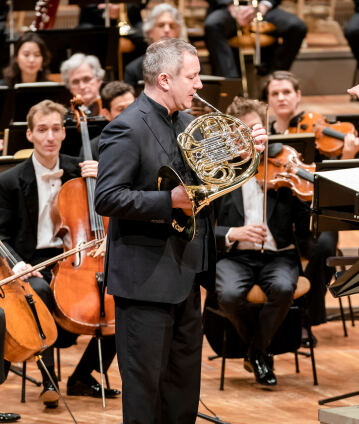Paavo Järvi and Stefan Dohr

Romanticism was not only an epoch of sensibility, but also of radical concepts. No work shows this more clearly than Hector Berlioz’s Symphonie fantastique. It portrays a drug-induced frenzy, a murder of passion, an execution and a witch’s Sabbath. No less exciting is Berlioz’s sound world: excessive, glaring, brutal – and then again enchantingly graceful. Paavo Järvi also conducts the world premiere of a horn concerto by Hans Abrahamsen. The soloist is Stefan Dohr.
Stefan Dohr, principal horn of the Berliner Philharmoniker, loves the classical and romantic repertoire. But his interest also extends to contemporary music, which he – as an interpreter and initiator of new works – intensively supports. Thus, he has premiered French horn concertos dedicated to him by Herbert Willi (2008), Jorge E. López (2009), Johannes Wallmann (2010), Toshio Hosokawa (2011) and Wolfgang Rihm (2014) – the concerto by Hosokawa, “Moment of Blossoming”, together with the Berlin Philharmonic conducted by Sir Simon Rattle.
Next up he will play another premiere with the orchestra, namely of a horn concerto by Hans Abrahamsen. The Danish composer, considered one of the leading figures on the contemporary music scene in his country, holds a multi-faceted musical dialogue with the past and cultivates an idiom of poetic and romantic intensity – whereby he refers in his works time and again to natural phenomena (as can be seen in titles like October, Snow, Woods, Storm og Stille etc.). The evening’s conductor is Paavo Järvi, who enthrals audiences around the globe with his differentiated interpretations bursting with energy. His love of music was handed down to him: born in Tallinn in 1962, son of the conductor Neeme Järvi, he first studied percussion and conducting, completing his education at the Curtis Institute of Music in Philadelphia and with Leonard Bernstein at the Los Angeles Philharmonic Institute. He has been the artistic director of the Deutsche Kammerphilharmonie Bremen for many years, and is chief conductor of the NHK Symphony Orchestra in Tokyo, a role he has also taken on with the Tonhalle-Orchester Zürich starting this season.
After the interval, the Berliner Philharmoniker and Paavo Järvi will turn to the Symphonie fantastique by Hector Berlioz, which, perhaps more than any other work in music history, deserves the genre description “symphonic poem”. The instrumental drama describes five “Episodes in the Life of an Artist” – not in reality, but rather in confused dreams. Heinrich Heine called the symphony “a bizarre sort of night piece” that is only “now and then illuminated by the sentimental whiteness of a woman’s robe fluttering to and fro or by a sulphur-yellow gleam of irony.” Indeterminate passions are captured in sound here, most radically in the Dream of a Witches’ Sabbath, the fifth and last movement of the symphony, which (as Berlioz reported) already overwhelmed his colleagues “by its satanic effect”.
© 2020 Berlin Phil Media GmbH
Related interviews